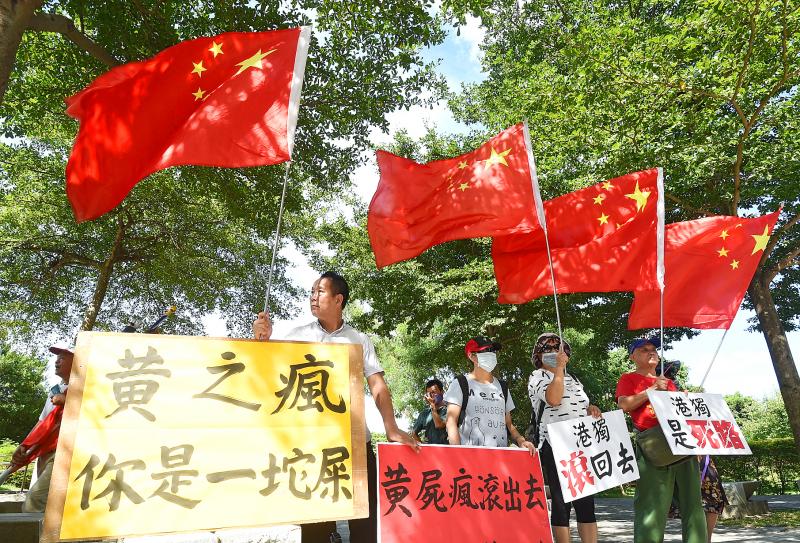Democratic Progressive Party (DPP) Legislator Wang Ting-yu (王定宇) proposed an amendment to the National Security Act (國家安全法) to ban activities that promote Taiwan’s unification with China, damage Taiwan’s national identify, or other actions that work in the favor of China, Hong Kong and Macau, or other foreign opposition forces.
The draft amendment includes fines of NT$10,000 to NT$100,000, with fines for displaying the People’s Republic of China flag of up to NT$50,000.
The proposed amendment has so far gathered support from 28 DPP lawmakers and Taiwan Statebuilding Party Legislator Chen Po-wei (陳柏惟).

Photo: Liu Hsin-de, Taipei Times
However, a number of Chinese Nationalist Party (KMT) spoke out against the proposal, citing freedom of speech concerns.
There is no law defining China as an enemy, KMT Legislator Chen Yu-jen (陳玉珍) said yesterday, adding that banning the flag would require amendments to the Act Governing Relations Between the People of the Taiwan Area and the Mainland Area (兩岸人民關係條例).
It would be more reasonable to ask people not to wave the flag or sing the national anthem of an enemy country, Chen said.
As the DPP holds the legislative majority, amending laws to define China as an enemy would not be hard, she said, adding that “as long as the process is democratic, I will support it.”
Taiwan People’s Party Legislator Jang Chyi-lu (張其祿) said that despite China’s threat to Taiwan, banning its flag would only be possible if a law defines China as an enemy country.
KMT caucus whip Lin Wei-chou (林為洲) said that a draft act must clearly define whether displaying the Chinese flag is covered by freedom of speech or constitutes subversion, adding that the biggest difference between Taiwan and China is that Taiwan is a democracy with freedom of speech.
KMT caucus secretary-general Lin Yi-hua (林奕華) said that the government should not limit freedom of speech, as this would be an “overreach of state power.”
KMT Legislator Lee Guei-min (李貴敏) said that several constitutional interpretations and court rulings have safeguarded the right to any form of expression.
The draft act would imperil the unity of Taiwanese and the sustainable development of the nation, Lee said, adding that provocation should be avoided in the interest of the nation.
Additional reporting by Huang Hsin-po

The disruption of 941 flights in and out of Taiwan due to China’s large-scale military exercises was no accident, but rather the result of a “quasi-blockade” used to simulate creating the air and sea routes needed for an amphibious landing, a military expert said. The disruptions occurred on Tuesday and lasted about 10 hours as China conducted live-fire drills in the Taiwan Strait. The Civil Aviation Administration (CAA) said the exercises affected 857 international flights and 84 domestic flights, affecting more than 100,000 travelers. Su Tzu-yun (蘇紫雲), a research fellow at the government-sponsored Institute for National Defense and Security Research, said the air

Taiwan is to commence mass production of the Tien Kung (天弓, “Sky Bow”) III, IV and V missiles by the second quarter of this year if the legislature approves the government’s NT$1.25 trillion (US$39.78 billion) special defense budget, an official said yesterday. Commenting on condition of anonymity, a defense official with knowledge of the matter said that the advanced systems are expected to provide crucial capabilities against ballistic and cruise missiles for the proposed “T-Dome,” an advanced, multi-layered air defense network. The Tien Kung III is an air defense missile with a maximum interception altitude of 35km. The Tien Kung IV and V

Trips for more than 100,000 international and domestic air travelers could be disrupted as China launches a military exercise around Taiwan today, Taiwan’s Civil Aviation Administration (CAA) said yesterday. The exercise could affect nearly 900 flights scheduled to enter the Taipei Flight Information Region (FIR) during the exercise window, it added. A notice issued by the Chinese Civil Aviation Administration showed there would be seven temporary zones around the Taiwan Strait which would be used for live-fire exercises, lasting from 8am to 6pm today. All aircraft are prohibited from entering during exercise, it says. Taipei FIR has 14 international air routes and

Taiwan lacks effective and cost-efficient armaments to intercept rockets, making the planned “T-Dome” interception system necessary, two experts said on Tuesday. The concerns were raised after China’s military fired two waves of rockets during live-fire drills around Taiwan on Tuesday, part of two-day exercises code-named “Justice Mission 2025.” The first wave involved 17 rockets launched at 9am from Pingtan in China’s Fujian Province, according to Lieutenant General Hsieh Jih-sheng (謝日升) of the Office of the Deputy Chief of the General Staff for Intelligence at the Ministry of National Defense. Those rockets landed 70 nautical miles (129.6km) northeast of Keelung without flying over Taiwan,